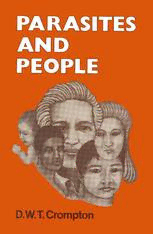
Parasites and People PDF
Preview Parasites and People
ISBN 978-0-333-32545-2 9 780333 325452 Parasites and People Parasites and People D.W.T. CROMPTON Department ofParasitology The Molteno Institute UniversityofCambridge Cover design and illustrations Paula Disanto Bensadoun M MACMILLAN © D.W.T. Crompton 1984 Allrights reserved. No part of this publication maybe reproduced or transmitted, in any form or by any means, without permission. First published 1984 Published by Higher and Further Education Division MACMILLAN PUBLISHERS LTD Houndmills, Basingstoke,Hampshire RG21 2XS and London Associatedcompanies in Auckland, Delhi, Dublin, Gaborone, Hamburg, Harare, Hong Kong, Johannesburg, Kuala Lumpur, Lagos,Manzini, Melbourne, Mexico City, Nairobi, New York, Singapore and Tokyo ForSusanAmold ISBN978-0-333-32545-2 ISBN978-1-349-17659-5(eBook) DOI 10.1007/978-1-349-17659-5 Contents PrefaceandAcknowledgements ListofAbbreviations 1 tlost-ParasiteRelationships 1 2 ParasiticOrganisms 5 :3 ParasitesofMan 24 4 Manastlost 51 5 TheEnvironmentoftlumanParasiticDisease 65 6 TransmissionandInfection 76 7 ImmuneResponses 87 8 Control 99 SuggestionsforFurtherReadingandReference 106 Index 109 Preface & Acknowledgements Until relatively recently, parasitology when applied to animal hosts was seen mainly as a rather specialized branch of zoology. Today it encompasses biochemistry, genetics, immunology, molecular biology, nutritional science, pharmacology and population biology. When man is the host, parasitology's interdisciplinary character becomes even more diverse as anthropology, economics, medical science, politics and sociology make their contributions. Parasitology is of much importance for those who live in the developing countries of the world and my concern for practical aspects was first aroused by my colleagues at Cornell University, New York. Professor Michael Latham and Dr. Lani Stephenson took me to work with them in Africa and Dr. Eduvigis Carrera and Dr. Patricia Day Bidinger shared with me their studies in Panama and India. I very much hope that Parasites and People will interest and help those who are beginning to work for the relief of human suffering. The production of this book owes much to the efforts of Dr. P.L. Clarke , Science Editor of The Macmillan Press Ltd., and to Ms Paula Disanto Bensadoun, Mrs. Zina Bulstrode and Miss Linda Keymer. The entire manuscript was read and improved by Dr. Jean Martin, The Molteno Institute, University of Cambridge. Dr. Anne Keymer, also of The Molteno Institute, and Dr. G.E. Dappen, Department of Biology, Nebraska Wesleyan University, commented on several chapters. Mr. J. D. Crompton, University College, Oxford, helped me with various editorial chores. I thank them all and I accept full responsibility for the errors and mistakes that may remain. The book could not have been written without the contributions of many scientists whose ideas, results and experiences are made freely available through libraries and learned journals. The text would have been unreadable if I had cited so many authors, but I am fully aware of my debt to them. I am also pleased to thank the copyright holders who kindly gave me permission to reproduce and use the following materials: Academic Press for Figure 2.1 redrawn from fig. 1.3 in Medical Virology (1970) by F. Fenner and D.O. White; American Institute of Biological Sciences for Tables 5.1, 5.2 and 5.3 which are based on tables 1 and 2 and information on page 679 in an article from BioScience 32 (1982) by D.W.T. Crompton and M.C. Nesheim; Blackwell Scientific Publications Ltd. for Table 7.3 based on table 2. 1 in Essential Immunology (1971) by I.M. Roitt, and for Figure 2.3 redrawn from fig. 2.3 in Animal Microbiology 1 (1977) by A. Buxton and G. Fraser; Food and Agriculture Organization of the United Nations for Table 4.1 based on information on page 54 in Human Nutrition in Tropical Africa, 2nd edition (1979) by M.C. Latham; Harper and Row Publishers Inc. for Figure 2.2 redrawn from fig. 2.2 on page 19 in Microbiology ( 1980) edited by B.D. Davis, R. Dulbecco, H.N. Eisen and H.S. Ginsberg; Longman Group Ltd. for Table 4.2 abstracted from table 13.1 in Human Nutrition and Dietetics, 6th edition (1982) by S. Davidson, R. Passmore, J.F. Brock and A.S. Truswell, and for Table 4.3 abstracted from table 1.1 in Practical Haematology, 4th edition (1974) by J.V. Dacie and S.M. Lewis; Dr. Arno Peters Of Bremen for Figure 5.1 which is based on his projection of the world; World Health Organization for Figure 4.1 redrawn with modifications from the flow diagram on page 8 in W.H.G. Technical Report Series No. 485 (1972), and for Figure 4.2 redrawn with modifi- cations from fig. (after Mata et al) in the chapter by J.E. Gordon in Nutrition in Preventive Medicine (1976) edited by G.H. Beaton and J.M. Bengoa. Figures 2.5, 6.2 and 7.1 are redrawn from figs. 1.29, 1.54, 3.2, 3.6, 3.11, 3.12, 3.13, 3.14, 3.25, 3.27 and 9.9 in Parasitic Worms (1980) by myself and S.M. Joyner, which was published in the Wykeham series of Taylor and Francis Ltd., London. Finally, I wish to acknowledge that I have not traced the appropriate source of permission for Figure 5.3 which is based on graphs in a mimeographed article entitled 'International nutritional considerations: the point of view from the under developed world' by F.B. Monckeberg. D.W.T. Crompton Cambridge Abbreviations oC degrees Celsius DNA deoxyribonucleic acid e.g. for example GNP gross national product H water 20 MJ megaJoule MW molecular weight N north % percentage r .b.c. red blood cell RE reticulo-endothelial (syst em) RNA ribonucleic acid S south spP. species (plural) U.K. United Kingdom U.S.A. United States of America U.S.$ United States dollar h hour min minute sec second yr year 1 litre dl decilitre ml millilitre kg kilogram g gram mg milligram m metre mm millimetre 11m micrometre nm nanometre Other abbreviations are explained in the text and tables.
